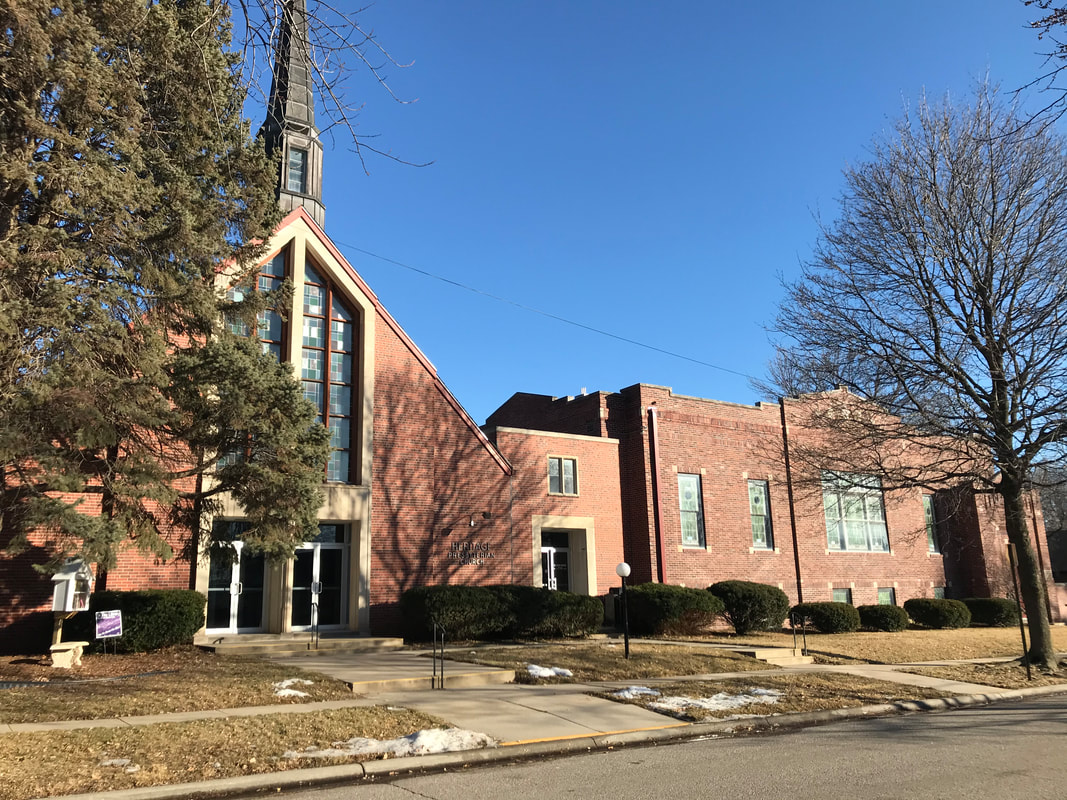Vital CongregationsThe purpose of the Vital Congregations Initiative is to work alongside leaders of existing congregations that are assessing, discerning and living into faithful actions that increase vitality. Through intentional spiritual practices that take them deeper into following Jesus Christ, congregations are transformed and the mission of God spreads throughout our particular communities and the world.
|
|
PC(USA)Vital Congregations Revitalization Initiative
Heritage Presbyterian is participating in the PC (USA) Vital Congregations (VC) Revitalization Initiative. Found out more information about the initiative through the links below: |
|
The 7 Marks of Vital Congregations

1: Lifelong Discipleship Formation
Lifelong Discipleship Formation is about daily life. It is about how we claim and proclaim our identity as followers of Christ. It is about how we practice our faith; how we grow in faith, cherish faith, and share faith in the world. Beyond mere words, how do people know we are disciples of Jesus Christ? No matter the age, it is about daily seeking and living in relationship with the living God. We are called to be righteous, to seek justice, to love mercy, and to walk humbly with God. Thus, Lifelong Discipleship Formation is about how we live into that right relationship with God, with all God’s people, and all of creation. It is about growing in the community of God’s grace, the church, and interpreting faith in our everyday life; confronting brokenness and sinfulness when we fall short of the glory of God and shining a bold light of Christ for all to see. Lifelong Discipleship Formation requires an awakened and engaged commitment to God, and to all people whom Christ loves. It is about the call to daily take up our cross and follow Christ.
Biblical References: Deuteronomy 11:13-21; Matthew 5:1-16; Luke 8:11-18; Acts 2:42-47; Romans 8:1-17; Philippians 3:9b
Lifelong Discipleship Formation is about daily life. It is about how we claim and proclaim our identity as followers of Christ. It is about how we practice our faith; how we grow in faith, cherish faith, and share faith in the world. Beyond mere words, how do people know we are disciples of Jesus Christ? No matter the age, it is about daily seeking and living in relationship with the living God. We are called to be righteous, to seek justice, to love mercy, and to walk humbly with God. Thus, Lifelong Discipleship Formation is about how we live into that right relationship with God, with all God’s people, and all of creation. It is about growing in the community of God’s grace, the church, and interpreting faith in our everyday life; confronting brokenness and sinfulness when we fall short of the glory of God and shining a bold light of Christ for all to see. Lifelong Discipleship Formation requires an awakened and engaged commitment to God, and to all people whom Christ loves. It is about the call to daily take up our cross and follow Christ.
Biblical References: Deuteronomy 11:13-21; Matthew 5:1-16; Luke 8:11-18; Acts 2:42-47; Romans 8:1-17; Philippians 3:9b

2: Intentional Authentic Evangelism
Evangelism is simply sharing the Good News. It is authentic, and it is intentional, not merely expressions of kindness or good moral ethics. We all have Good News to share in our lives; it is a part of our identity. And when we share this news, it is with intentionality and with people with whom we have relationships. We do not have to be trained to share the good news of a new job, baby or puppy! We simply share what is beautiful and dear to us. Therefore, evangelism must be connected to lifelong Christian Formation. It is through intentional spiritual practices in the faith community that we meld God’s Story with our story, and we share that story with people in our daily lives.
Biblical References: Psalm 96; Matthew 4:19-20; Mark 4:1-20; John 3:11-21; 4:1-41; Romans 10:1-17; 2 Corinthians 4:7; Galatians 2:19b-20; 1 Peter 3:13-22
Evangelism is simply sharing the Good News. It is authentic, and it is intentional, not merely expressions of kindness or good moral ethics. We all have Good News to share in our lives; it is a part of our identity. And when we share this news, it is with intentionality and with people with whom we have relationships. We do not have to be trained to share the good news of a new job, baby or puppy! We simply share what is beautiful and dear to us. Therefore, evangelism must be connected to lifelong Christian Formation. It is through intentional spiritual practices in the faith community that we meld God’s Story with our story, and we share that story with people in our daily lives.
Biblical References: Psalm 96; Matthew 4:19-20; Mark 4:1-20; John 3:11-21; 4:1-41; Romans 10:1-17; 2 Corinthians 4:7; Galatians 2:19b-20; 1 Peter 3:13-22

3: Outward Incarnational Focus
If Discipleship Formation is about learning/understanding/living the Good News, and Authentic Evangelism is about intentionally sharing the Good News in relationships, then Outward Incarnation is about not limiting where and to whom we share the Good News. Outward Incarnational Focus is about being the gathered community of Christ sent out! We go not because we have a strategy for new membership; we go because we have a Savior who commanded us to be on God’s mission. We go because God’s saving love in Christ, cannot be inwardly contained in our buildings when we live with neighbors in need and a hurting world. The Good News is meant to transform and transcend. The church is meant to be a beacon of Christ’s grace, justice, freedom, and love. Outward incarnational focus means we daily take up our cross and follow to the marginalized of society, the poor among us, the suffering and sick, the stranger and enemy, the down-trodden and “the least of these.” We do not just focus on bringing similar or like-minded people inside to assimilate to our way of doing things; nor do we just go to people and places that are familiar and comfortable. Outward Incarnational focus, requires an emboldened faith, that goes because Christ is already present, and calls us to join.
Biblical References: Matthew 7:14; 8:18-23; 25:31-46; Luke 6:27-36; 9:1-6; 10:1-12; 19:1-10; 23-27; Romans 12:1-21; 2 Peter 1:16-21
If Discipleship Formation is about learning/understanding/living the Good News, and Authentic Evangelism is about intentionally sharing the Good News in relationships, then Outward Incarnation is about not limiting where and to whom we share the Good News. Outward Incarnational Focus is about being the gathered community of Christ sent out! We go not because we have a strategy for new membership; we go because we have a Savior who commanded us to be on God’s mission. We go because God’s saving love in Christ, cannot be inwardly contained in our buildings when we live with neighbors in need and a hurting world. The Good News is meant to transform and transcend. The church is meant to be a beacon of Christ’s grace, justice, freedom, and love. Outward incarnational focus means we daily take up our cross and follow to the marginalized of society, the poor among us, the suffering and sick, the stranger and enemy, the down-trodden and “the least of these.” We do not just focus on bringing similar or like-minded people inside to assimilate to our way of doing things; nor do we just go to people and places that are familiar and comfortable. Outward Incarnational focus, requires an emboldened faith, that goes because Christ is already present, and calls us to join.
Biblical References: Matthew 7:14; 8:18-23; 25:31-46; Luke 6:27-36; 9:1-6; 10:1-12; 19:1-10; 23-27; Romans 12:1-21; 2 Peter 1:16-21

4: Empower Servant Leadership
All people of God, in the image of Christ, are given fruit of the Spirit and spiritual gifts meant for building up the Church. In this way, we are all called to serve the Lord, to do our part in membership of the body of Christ. Every part is necessary. Every part is valuable, and every voice is important. Every person should be equipped, nurtured, and supported to use their gifts to glorify God, through servant leadership; not just cliques of powerful people or continual burnout of the same leaders. In keeping with true Discipleship Formation, churches are called to help all members to be empowered to use their gifts in servant leadership. And, God calls and equips some for the particular task of pastoral ministry, which must be cultivated, nurtured and trained. Ministry can never be about a single pastor, but it is about identifying, equipping and empowering those servant leaders God puts in our midst.
Biblical References: 1 Samuel 3:2; Matthew 9:37-38; John 13:1-20; Ephesians 4:1-16; 1 Timothy 2:14-26; 4:6-16
All people of God, in the image of Christ, are given fruit of the Spirit and spiritual gifts meant for building up the Church. In this way, we are all called to serve the Lord, to do our part in membership of the body of Christ. Every part is necessary. Every part is valuable, and every voice is important. Every person should be equipped, nurtured, and supported to use their gifts to glorify God, through servant leadership; not just cliques of powerful people or continual burnout of the same leaders. In keeping with true Discipleship Formation, churches are called to help all members to be empowered to use their gifts in servant leadership. And, God calls and equips some for the particular task of pastoral ministry, which must be cultivated, nurtured and trained. Ministry can never be about a single pastor, but it is about identifying, equipping and empowering those servant leaders God puts in our midst.
Biblical References: 1 Samuel 3:2; Matthew 9:37-38; John 13:1-20; Ephesians 4:1-16; 1 Timothy 2:14-26; 4:6-16

5: Spirit-Inspired Worship
Spirit-Inspired worship is a gift of God’s wonder! Six days we labor and toil, and on this Holy Sabbath day we get to come into the presence of God; we get to encounter the awesome mystery of the God who longs to be known in relationship with us. We worship, because through prayer and supplication, through the Word proclaimed and the Sacraments celebrated, through the songs of praise and passing of peace – God meets us there. Worship is our lifeline to the Holy God. Our worship should be active participation into the living relationship with the triune God; thus, all should feel welcome and have a place. Worship should challenge, teach, transform, convict, and call us into deeper relationship with God and one another; not gratify our comforts and entertain our desires. Worship is an encounter with God that we understand and do not understand. It is an act filled with mystery and awe, but in worship we have the opportunity to express our deepest desires to God and listen for God’s voice. In worship, we also experience the call to serve and be on mission.
Biblical References: Exodus 3:1-6; Deuteronomy 12; 1 Chronicles 16:7-36; Isaiah 6:1-13; 29:13; Matthew 21:12-17; Luke 24:13-35; Philippians 2:1-11; Hebrews 5:1-10; 12:28-29; Revelation 22:1-7
Spirit-Inspired worship is a gift of God’s wonder! Six days we labor and toil, and on this Holy Sabbath day we get to come into the presence of God; we get to encounter the awesome mystery of the God who longs to be known in relationship with us. We worship, because through prayer and supplication, through the Word proclaimed and the Sacraments celebrated, through the songs of praise and passing of peace – God meets us there. Worship is our lifeline to the Holy God. Our worship should be active participation into the living relationship with the triune God; thus, all should feel welcome and have a place. Worship should challenge, teach, transform, convict, and call us into deeper relationship with God and one another; not gratify our comforts and entertain our desires. Worship is an encounter with God that we understand and do not understand. It is an act filled with mystery and awe, but in worship we have the opportunity to express our deepest desires to God and listen for God’s voice. In worship, we also experience the call to serve and be on mission.
Biblical References: Exodus 3:1-6; Deuteronomy 12; 1 Chronicles 16:7-36; Isaiah 6:1-13; 29:13; Matthew 21:12-17; Luke 24:13-35; Philippians 2:1-11; Hebrews 5:1-10; 12:28-29; Revelation 22:1-7

6: Caring Relationships
Caring relationships seems an easy mark of vitality. We all want a place to belong; people who care about us. Many congregations would argue: “this is why we come together; we welcome and care for each other.” Yet, Caring Relationships in Christ requires true agape love; a sacrificial, self-emptying, perfect love. Although we are imperfect, it is about striving to see all people the way Christ sees them; not from judgments or preconceived perceptions. It is about helping walk with others, responding to their needs, desiring their well-being. It is about walking with people in tragedy and rejoicing in their triumphs. Caring Relationships of God is about allowing people to be real in their stories, without hiding or holding back, and loving every imperfect part of them. Church should be the one place where the God who already knows, encounters our honest confession, and allows us to give testimony. It should be the place where conflicts are confronted, crucial conversations of forgiveness and reconciliation are had, and people of God are transformed by agape-love. Caring Relationships is about vulnerability and trust. It is about meeting all people of God where they are, and sharing our One Savior, Jesus Christ. Caring Relationships do not come through hospitality and welcoming committees, they come through a carefully cultivated environment that is genuine and sincere in being the household of God.
Biblical References: John 8:1-12; 13:35; 21: 15-19; Acts 6:1-7; Romans 12:9-18; 15:1-6; Galatians 6:1-10; Hebrews 10:24-25
Caring relationships seems an easy mark of vitality. We all want a place to belong; people who care about us. Many congregations would argue: “this is why we come together; we welcome and care for each other.” Yet, Caring Relationships in Christ requires true agape love; a sacrificial, self-emptying, perfect love. Although we are imperfect, it is about striving to see all people the way Christ sees them; not from judgments or preconceived perceptions. It is about helping walk with others, responding to their needs, desiring their well-being. It is about walking with people in tragedy and rejoicing in their triumphs. Caring Relationships of God is about allowing people to be real in their stories, without hiding or holding back, and loving every imperfect part of them. Church should be the one place where the God who already knows, encounters our honest confession, and allows us to give testimony. It should be the place where conflicts are confronted, crucial conversations of forgiveness and reconciliation are had, and people of God are transformed by agape-love. Caring Relationships is about vulnerability and trust. It is about meeting all people of God where they are, and sharing our One Savior, Jesus Christ. Caring Relationships do not come through hospitality and welcoming committees, they come through a carefully cultivated environment that is genuine and sincere in being the household of God.
Biblical References: John 8:1-12; 13:35; 21: 15-19; Acts 6:1-7; Romans 12:9-18; 15:1-6; Galatians 6:1-10; Hebrews 10:24-25

7: Ecclesial Health
Ecclesial Health is about: 1) Why we gather as a church community 2) How we practice being church together. It is about whether our mission, vision, and values match up with the ways we live together. It requires continual attentiveness, awareness, and assessment in asking “are we who we say we are?” And more importantly, “are we who God is calling us to be?” Prayer and discernment are at the heart of Ecclesial health! There are several factors to Ecclesial health: prayerful discernment, decision-making process, health of pastors, stewardship of budget and resources, clarity in mission and ministries. Ecclesial Health is about the people of God having a clear purpose; all people are stake-holders invested in being a part of this community of faith. There are shared core values, a clear mission, and commitment and loyalty to the life we gather in as church. Yet, they also know that this is a living faith. So, they dare to dream and understand that change is inevitable. With Ecclesial Health, there is joy and gratitude in coming together; people, not programs or properties are valued. People gather and are sent to be Christ’s Church.
Biblical References: Matthew 15:1-9; Luke 24:13-35; John 2:13-25; 17; Romans 6:1-14; 1 Corinthians 12:14, 24b-25; 2 Corinthians 5:11-21; Colossians 2:1-19; 1 Timothy 6:11-21
Ecclesial Health is about: 1) Why we gather as a church community 2) How we practice being church together. It is about whether our mission, vision, and values match up with the ways we live together. It requires continual attentiveness, awareness, and assessment in asking “are we who we say we are?” And more importantly, “are we who God is calling us to be?” Prayer and discernment are at the heart of Ecclesial health! There are several factors to Ecclesial health: prayerful discernment, decision-making process, health of pastors, stewardship of budget and resources, clarity in mission and ministries. Ecclesial Health is about the people of God having a clear purpose; all people are stake-holders invested in being a part of this community of faith. There are shared core values, a clear mission, and commitment and loyalty to the life we gather in as church. Yet, they also know that this is a living faith. So, they dare to dream and understand that change is inevitable. With Ecclesial Health, there is joy and gratitude in coming together; people, not programs or properties are valued. People gather and are sent to be Christ’s Church.
Biblical References: Matthew 15:1-9; Luke 24:13-35; John 2:13-25; 17; Romans 6:1-14; 1 Corinthians 12:14, 24b-25; 2 Corinthians 5:11-21; Colossians 2:1-19; 1 Timothy 6:11-21
If you have any additional questions, please feel free to contact:
Pastor Erica Nelson
[email protected]
402-477-3401
Karen Griffin-Sieber
[email protected]
402-430-2872
Nancy Weyers
[email protected]
402-540-4815
Pastor Erica Nelson
[email protected]
402-477-3401
Karen Griffin-Sieber
[email protected]
402-430-2872
Nancy Weyers
[email protected]
402-540-4815

